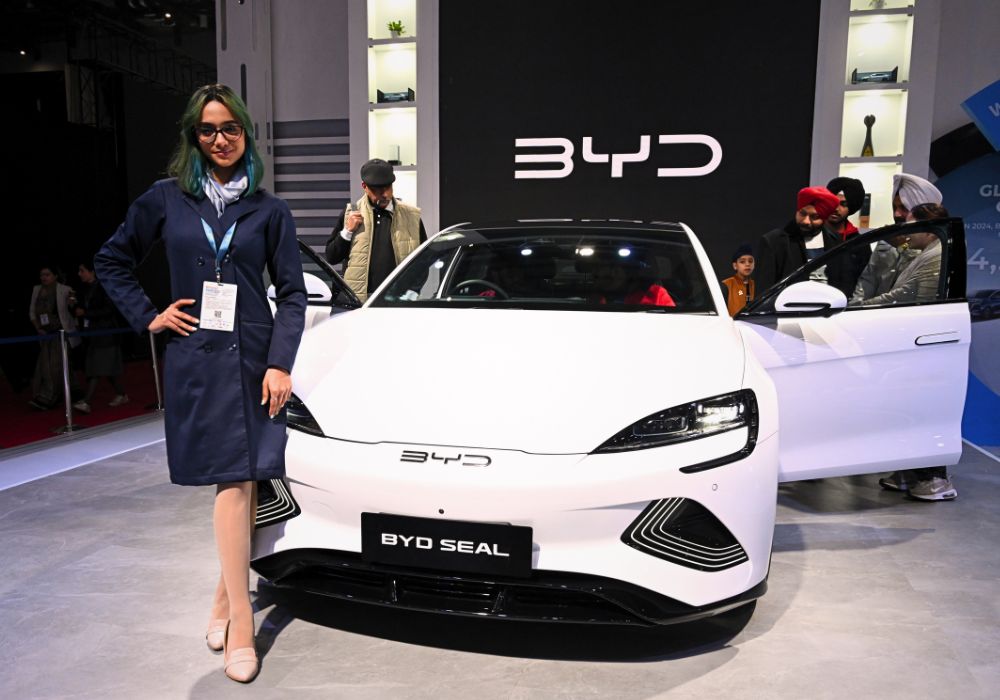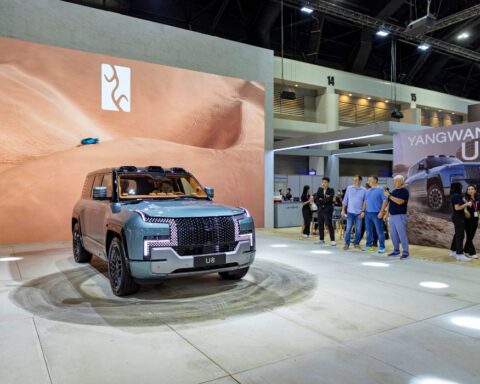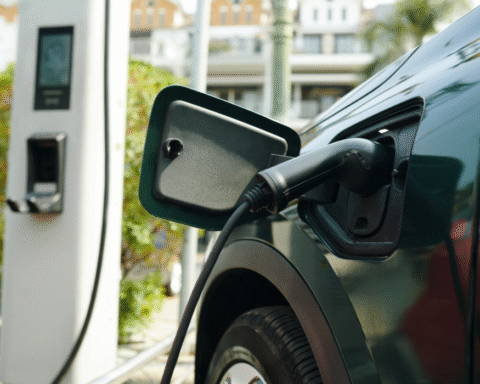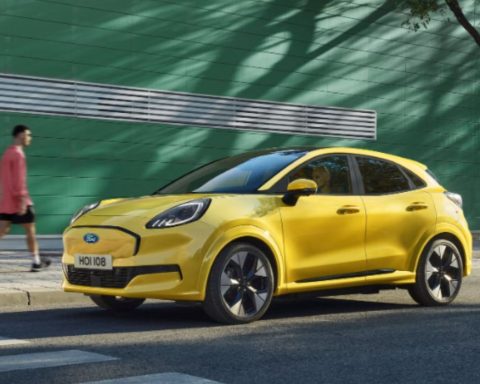Canada’s efforts to protect its auto sector and investments in electric vehicle manufacturing may not be yielding the intended benefits for either the industry or consumers. A September report released by senior economists with TD Bank, entitled Canadians Need to Think Strategically on Electric Vehicles and China, recommends that the federal government reconsider its decision to erect a tariff wall barring the import of electric cars made in China.
The transition from gas to zero-emission vehicles has hit some speed bumps lately. Only three years ago, automakers and governments alike pledged significant capital investment into retooling manufacturing sites, upskilling auto workers and securing supply chains, to support the gradual replacement of conventional cars with battery-run vehicles.
To safeguard Canada’s nascent electric vehicle industry, the federal government imposed a 100% tariff on Chinese EVs in October 2024, matching the 100% tariffs under U.S. president Joe Biden that took effect a month earlier.
President Trump’s arrival at the White House has since upended the economic landscape. The Trump administration has launched a trade war on Canada that includes a 25% tariff on automobiles, light trucks and auto parts that fail to meet the regulatory requirements under the trade agreement between Canada, the United States and Mexico (CUSMA).
The U.S. import taxes coincide with Canadian federal requirements to produce more electric vehicles. Former prime minister Justin Trudeau oversaw the adoption of new rules that required that 20% of total passenger car sales be electric by 2026. Between the import tariffs and the looming deadline to supply more EVs, legacy automakers such as General Motors, Ford and Stellantis pushed back, arguing that the federal mandate is simply not feasible.
“With EV sales falling for five months in a row . . . there is no pathway to meeting the government mandated target,” Brian Kingston, president and chief executive of the Canadian Vehicle Manufacturers’ Association, argued in The Globe and Mail, adding that “Canadians are clearly not ready for widespread EV adoption.”
Responding to industry pressure, Prime Minister Mark Carney suspended the 2026 EV sales target, saying that automakers have “got enough on their plate.”
The carmakers want the free market when it suits them, but they don’t want the free market when it doesn’t suit them.
– Daniel Breton, CEO, Electric Mobility Canada,
Indeed, new registrations for battery-electric vehicles dropped by 39.2% in the second quarter of 2025, according to Statistics Canada. But Joanna Kyriazis with Clean Energy Canada takes issue with the cause of plummeting sales – which, she notes, is occurring only in Canada as EV purchases continue to climb upward in much of the rest of the world.
“Our polling from this year shows that 45% of Canadians still lean towards an electric vehicle for their next purchase,” Kyriazis counters, adding that the percentage rises to 69% in metro Vancouver. “The interest is there, but upfront cost remains a top barrier. The pause in provincial and federal buyer incentives means buyers are waiting on the sidelines to see if those programs are coming back.”
Despite the recent spate of automakers announcing delays and cancellations of EV rollouts, the tariff on Chinese-made EVs remains in place. The situation has turned into a political tug-of-war: OEMs (original equipment manufacturers) as well as Ontario Premier Doug Ford say that the tariff barrier is still needed. Others, such as Daniel Breton, president and CEO of Electric Mobility Canada, disagree. “We’ve been against the 100% tariff from the get-go. [Canada] imposed the tariff to play nice with the U.S. But here we are a year later and playing nice hasn’t given us any advantages.”
The TD report makes the case that blocking electric cars made outside of North America from the Canadian market may not, in fact, be in anyone’s interests.
The tariff wars
Globally, sales of battery-electric cars are surging. Brazil, which has been open to Chinese imports, has seen EV sales soar more than 500% between 2022 and 2024, and Chinese automaker BYD has established a significant presence in the Brazilian market.
Bloomberg reports that Brazil plans to reintroduce import taxes at rates ranging from 10% to 35% by June 2026 to encourage domestic investment. Subsequently, Chinese carmakers BYD, GAC and Great Wall Motor are all setting up local manufacturing plants with the promise of job creation and economic growth.
For its decision to block Chinese entrants, Canada has been hit with a 76% tariff on Canadian canola seed imports and a 100% tariff on canola oil, meal and peas. China also put a 25% tariff on certain Canadian pork, fish and seafood products.
Kyriazis points out that Canadians bear the cost in other ways as the two countries ratchet up import taxes. “We are walling off our car market so that it’s no longer competitive. Canada has an EV affordability problem. We found 20 EV models available today in the EU market for less than $40,000 Canadian, only one of which can be bought here.”
Kyriazis is not alone in this observation. Writing for The Conversation, Addisu Lashitew of McMaster University says that a freer trade regime with China would substantially broaden the range of affordable EVs available to Canadians, “who are currently limited to U.S. brands averaging more than US$55,000. By contrast, Chinese manufacturers offer numerous models priced near US$25,000, a factor that would likely spur a substantial increase in EV adoption.”
Building bridges instead of barriers
“This 100% tariff was meant to buy our domestic auto sector time to ramp up and get more competitive. Instead, we’ve seen many EV-related investments and production plans being delayed or cancelled. We’ve seen carmakers backtrack on their EV-related goals,” Kyriazis says.
According to the TD assessment, blocking entrance of EVs from China has curtailed domestic adoption of the most advanced battery technology on the market, noting that Chinese OEMs are miles ahead of everyone else in offering affordable vehicles that, in some cases, are cheaper than comparable models running on internal combustion engines.
Thanks to China’s formidable head start in EV production, Chinese auto manufacturers like BYD, SAIC and Geely produced 70% of the electric cars sold globally in 2024, according to the International Energy Agency. Automakers in the United States produced just 5%. The more electric vehicles that Chinese companies make, TD economists argue, the more difficult it will be for carmakers in North America to catch up.
Moreover, Canada’s protectionist policies may be encouraging a sense of complacency – or worse. “In 2019, the International Energy Agency published a report that placed Canada dead last in the world for fuel efficiency of its light-duty vehicle fleet and GHG emissions per kilometre driven,” Breton says. “This means that we’re driving gas guzzlers as a country. So when I hear that some carmakers want us to keep driving gas guzzlers by aligning with the U.S., to me this is completely stunning.”
RELATED
Who’s trying to kill the $17,000 electric car?
How subsidized leasing can drive EV adoption
Lack of charging stations in high-rise buildings is cutting off access to EVs
Given the gap in EV technology and heightened risk of falling too far behind, the TD report recommends that partnerships between Canadian and Chinese car companies could be formed so that Canada can improve its EV ecosystem. Simultaneously, joint ventures with Chinese automakers would likely help Canada return its EV adoption rate to an upward trajectory by overcoming cost concerns and range anxiety.
Canadians appear to support the prospect of opening the market to Chinese entrants. In a recent Nanos Research survey with CTV News, 62% of respondents said they either support or somewhat support removing the 100% tax on Chinese-made EVs.
Says Breton, “The carmakers want the free market when it suits them, but they don’t want the free market when it doesn’t suit them. And to me, the China conversation is about that as well.”
Victoria Foote is a writer and editor who specializes in clean energy and climate.
The Weekly Roundup
Get all our stories in one place, every Wednesday at noon EST.







